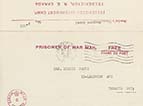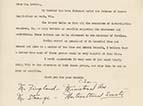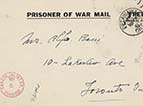Those Left Behind: Families and Community
Thank God that my mother had her mother and father here. Otherwise we would have starved or my mother would have had to do something to support us. I don't know what she could have done because she was not educated. The Canadian government refused to give us any assistance because we were a family of enemy aliens. I don't understand to this date. My father, my mother, myself, we’re all born in Vancouver. And we were born Canadians. Yet, we were treated like enemy aliens.
Attilio Girardi, son of internee Bruno Girardi, video interview, Columbus Centre Collection
I think we were not allowed to go right away. I think it was a year later. And my grandmother, my mother, and myself, we went. And I remember my mother saying to me, "Now listen, when you see your father, it's a little while he's in camp. He might be thin. He might not look too well. I don't want you to make a comment or anything.” We get there [and my father] looks like a flower. He's just great. And he has a big scab on his right elbow. So my mother said "What happened to your arm?" “Oh,” he said, "we were playing rugby and I fell." My mother said, "Per la Madonna…" She says, “Here I am in three jobs, working, everything and they're you know…"
Vladimira Dalle Vedove Tontini, daughter of internee Angelo Dalle Vedove, video interview, Columbus Centre Collection
The majority of internees were men with families, and often the sole breadwinners. The assets of most internees were seized by the Custodian of Enemy Property. Bank accounts were frozen. Wives, or other family members, had to request the government’s permission to access funds. The women did whatever it took to make ends meet. They worked as seamstresses, provided laundry and housekeeping services, and took in boarders. In the husbands’ absence, they managed the family business with the government overseeing their activities.
Families had to adjust to the trauma of having a spouse or parent taken away by police with little or no explanation. In some cases, they did not know the whereabouts of their loved ones for weeks. Notification of internment came when internees sent letters from camp.
Families were actively involved in approaching lawyers, priests, and local Members of Parliament in an attempt to have internees freed. There were also those who tried to profit from the suffering of internee families. In Guelph, the father of an internee was asked for a large sum of money to secure a release. Such cases also occurred in Windsor and Montreal.



